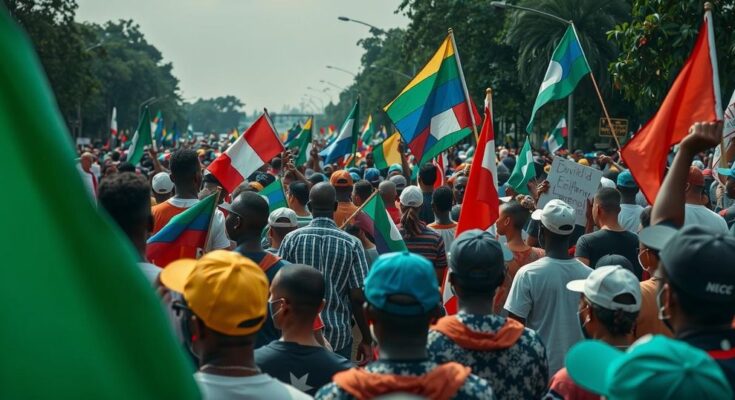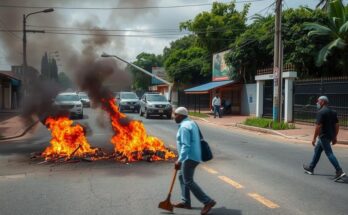Nigerians are protesting against severe economic hardship, marked by significant food inflation and government measures deemed harmful to the poor. The demonstrations, occurring in various cities, reflect widespread discontent with the current administration’s policies and their impact on everyday life. Despite heavy police presence and violent crackdowns on previous protests, citizens remain resolute in their demands for change and justice.
In Nigeria, protests are erupting in response to escalating economic difficulties, characterized by soaring food prices and significant hardship for ordinary citizens. Demonstrations took place across several cities, including Abuja and Lagos, where protesters expressed their discontent with current government policies seen as detrimental to the poor. The protests were ignited by record food inflation, which has caused many businesses to close and left countless individuals facing hunger. On a day that coincided with Nigeria’s 64th Independence Day celebrations, demonstrators marched in the capital, Abuja, despite a heavy police presence, which included the use of tear gas to disperse crowds. Activists from the “Take it Back” movement criticized the government for its perceived disconnect with the struggles faced by the populace, emphasizing the urgent need for reforms to alleviate poverty and hunger. The situation has been exacerbated since President Bola Ahmed Tinubu assumed office in May 2023. His government implemented fiscal measures recommended by the World Bank, such as removing fuel subsidies and unifying foreign exchange markets, which have led to unprecedented inflation and a drastic devaluation of the naira. As a consequence, the cost of basic food items has surged, putting immense strain on Nigerian families who already grapple with low wages. Furthermore, concerns have been raised regarding the government’s approach to protests, with reports of rights abuses and excessive force used by security forces against demonstrators. While some activists have been arrested and charged with serious offenses during previous protests, many citizens fear for their safety yet continue to demand accountability and change. Despite the risks, protest leaders have vowed to persist until their demands for better governance and poverty alleviation are met, asserting that the government must prioritize the needs of its citizens over foreign interests. The protests reflect a growing frustration among Nigerians who feel abandoned by a government more focused on maintaining power than addressing the pressing economic crises affecting their lives.
The protests in Nigeria are rooted in a context of severe economic distress, with the nation facing its highest food inflation levels in decades. Factors contributing to this crisis include the aftermath of the COVID-19 pandemic, poor economic management, and ongoing security issues that hinder local food production. When President Bola Ahmed Tinubu took office, he swiftly enacted measures that led to a significant increase in fuel prices and currency devaluation, further aggravating the economic situation for many Nigerians. The protests, which have garnered both national and international attention, highlight the urgent need for governmental change in response to the struggles faced by the Nigerian populace.
The ongoing protests in Nigeria signify deep-rooted frustrations with economic policies perceived as harmful to the average citizen. As citizens continue to confront escalating costs of living and the impact of government measures, calls for reform grow louder. The government’s response, characterized by a heavy-handed approach to dissent, raises concerns over civil liberties and the ability of the populace to voice their grievances. Ultimately, the protests may serve as a catalyst for change as Nigerians demand accountability and a more equitable economic policy.
Original Source: www.aljazeera.com




